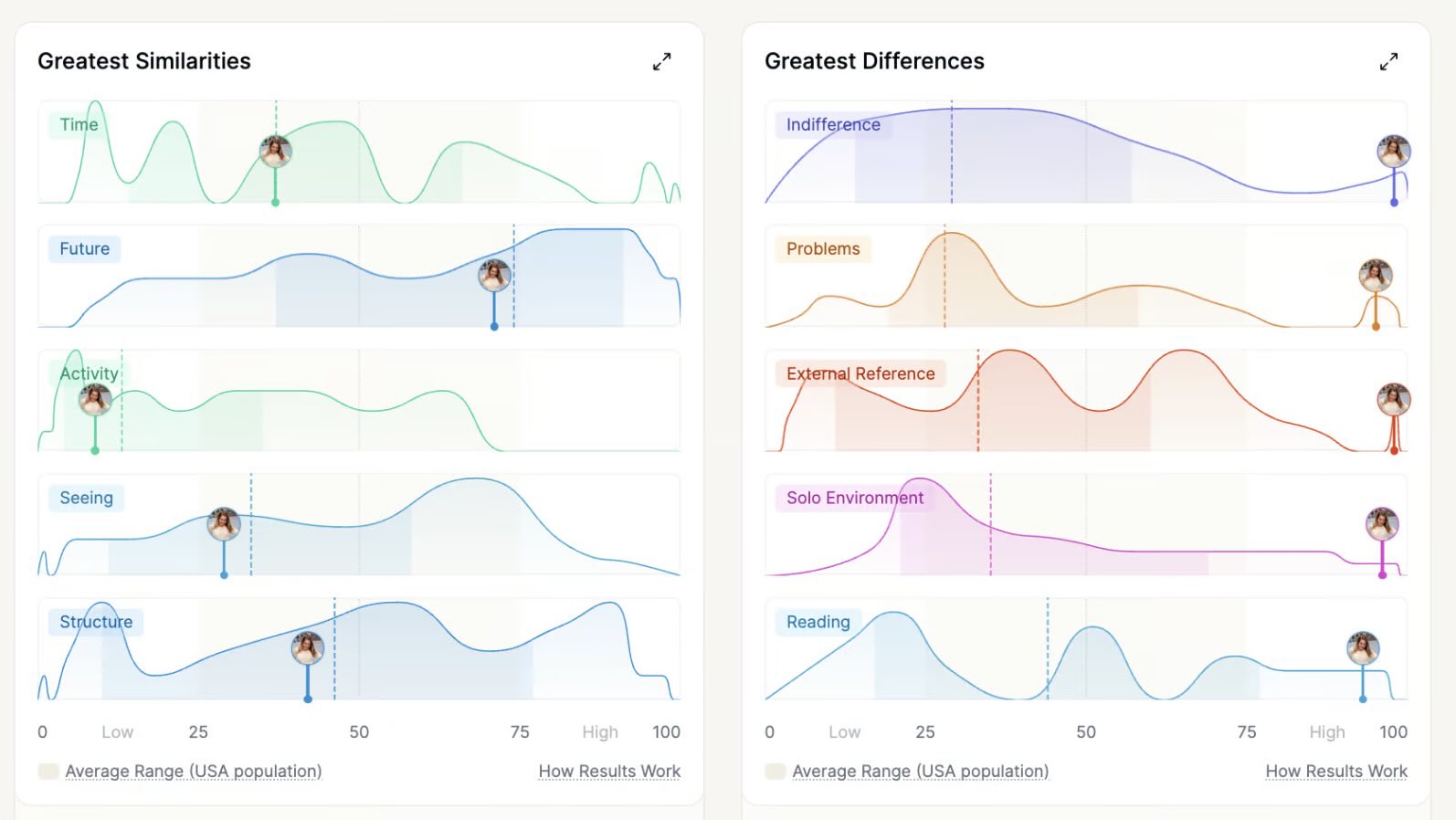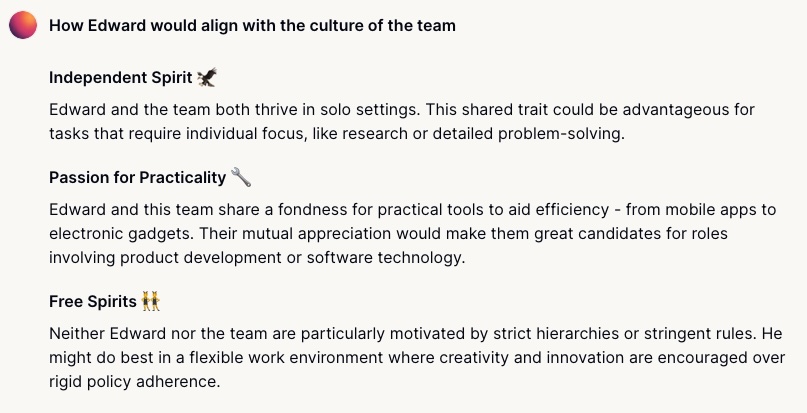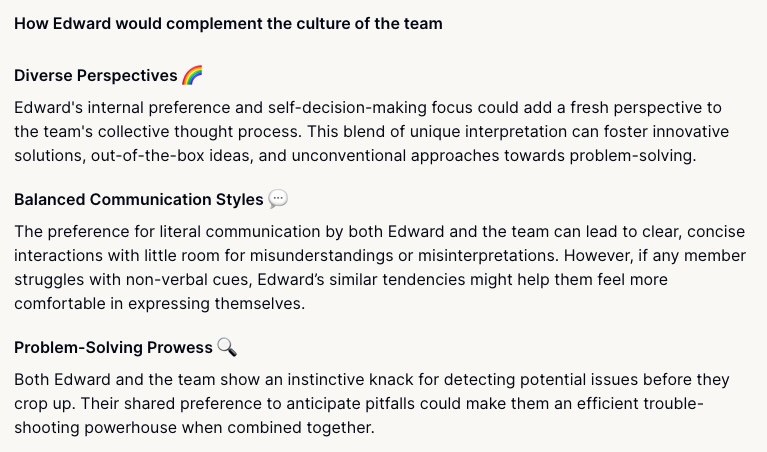How to rethink cultural fit and hire for impact
Culture isn’t about hiring people who fit in—it’s about finding those who bring new, diverse strengths to your team. In today’s workplaces, that mindset shift fuels innovation. Here’s how to rethink "cultural fit"—and ask smarter, impact-driven questions.
- Author
 William Haigen
William Haigen

Too often, companies use culture as a shorthand for hiring people who feel familiar—those who think like us, work like us, and see the world like us. But this approach quietly narrows your talent pool, reinforces blind spots, and can stall innovation.
What truly drives a thriving team isn’t sameness—it’s a mix of perspectives, motivations, and work styles that challenge and complement each other. The most impactful teams aren’t built by hiring more of the same. They’re built by bringing in the strengths you’re missing.
If your goal is to create a dynamic and inclusive workplace, it’s time to rethink what you’re really looking for. Not someone who “fits,” but someone who adds.
What is cultural fit?
In traditional hiring practices, “cultural fit” has been used to describe how well a candidate’s personality, values, or working style align with an existing team or company culture. It’s often assessed through interview questions about how someone approaches collaboration, conflict, or decision-making, aiming to predict how seamlessly they’ll blend in.
But here’s the problem: too often, this approach favors familiarity over diversity. When hiring decisions are made based on who feels like a “good fit,” it can unintentionally reinforce sameness, leading to teams that think alike, work alike, and miss out on valuable differences.
Rather than asking “Will this person fit in?” a better question is: “What strengths or perspectives could this person bring that we don’t already have?” That’s where true innovation—and a stronger culture—begins.
The challenge with hiring for cultural fit
It’s tempting to build a team of people who just click. Shared interests, similar work styles, the same approach to problem-solving—it feels comfortable, and it can make collaboration seem smoother. But comfort isn’t the same as effectiveness.
While homogeneous teams may avoid conflict, they often miss out on creativity. When everyone sees the world the same way, challenges go unchallenged. Innovation stalls. Blind spots grow. Research shows that cognitively diverse teams—those made up of different thinking styles, motivations, and lived experiences—consistently outperform those built on sameness.
Yes, it takes more effort. Diverse teams require stronger communication, curiosity, and respect for different perspectives. But that’s the kind of stretch that fuels growth, not just for individuals, but for businesses as well.
So instead of asking, “Will this person fit in?” ask: “Will they help us think differently, stretch further, or connect with people we’re not reaching yet?” That’s the real marker of a high-performing team—not alignment, but complementarity.
3 risks of hiring for cultural fit (the old way)
When hiring decisions are made based on comfort, familiarity, or a narrow definition of “fit,” your team might feel aligned on the surface, but underneath, cracks start to show.
1. Blind spots multiply
Hiring people who mirror your thinking may feel efficient, but it silently reinforces assumptions that go unchallenged. Over time, this creates blind spots—unseen gaps in awareness that can lead to poor decisions or missed opportunities. When everyone sees things the same way, who’s left to ask the tough questions?
2. Team structural flaws
Homogeneous teams may avoid conflict, but that’s not always a good thing. When everyone shares the same communication style, decision-making approach, or even friendship circles outside of work, it becomes harder to give feedback or disagree productively. Accountability takes a back seat, and real growth stalls.
3. Creativity gets crowded out
Innovation thrives on tension—the kind that comes from diverse thinking styles, lived experiences, and different ways of working. When teams are built around ease and harmony, you lose the friction that fuels creativity. Yes, it’s messier. But it’s also where breakthrough ideas live.
How to prepare "culture add" questions for your next interview
If you want to build a team that thrives on diversity of thought, experience, and motivation, it’s time to stop asking who “fits” and start asking who adds.
Preparing culture add questions means flipping the traditional interview script. Instead of trying to spot candidates who echo your team’s current dynamics, look at what’s missing. Where are the gaps in thinking styles, collaboration approaches, or soft skills? What kinds of voices haven’t been heard at the table?
A strong team isn’t made of lookalikes—it’s built like a well-balanced ecosystem. That starts by identifying your team’s current makeup (tools like Marlee’s motivation assessment can help) and getting clear on which traits would complement, not mirror, your culture. Marlee helps you build a visual map of your team’s workstyle dynamics.

A Marlee Team Distribution Board showing the greatest similarities and differences
From there, structure your interview questions to explore whether a candidate brings fresh strengths and how well they work with those who think differently. Because the real test isn’t whether they blend in. It’s whether they can collaborate across differences with empathy, adaptability, and curiosity.
Ideas for smarter cultural add interview questions
Once you’ve mapped out what your team is missing—whether it’s a fresh perspective, a different decision-making style, or new soft skills—it’s time to bring that insight into the interview room.
The goal? Ask questions that help you uncover how a candidate might complement your existing team, not simply align with it. Below, you’ll find question prompts designed to surface collaboration skills, adaptability, values, and diverse ways of thinking—so you can make more informed, impactful hiring decisions.
Teamwork-related questions
- In your previous role, can you share an example of a project or situation where you had to collaborate with a diverse team to achieve a common goal? How did you contribute to the team's success, and what challenges did you encounter along the way?
- Teamwork involves effective communication. In your professional career, how do you ensure that information is shared transparently and consistently within your team? Can you provide an instance where your communication skills made a significant impact on a team project?
- How do you handle disagreements or conflicts within a team? Can you provide an example of a time when you had a differing opinion from a team member? How did you resolve it to maintain a positive and productive working relationship?
Problem-solving skills questions
- From your previous work experiences, can you describe a specific instance where you had to work with a diverse team to solve a complex problem? How did you handle any challenges related to communication or collaboration?
- Describe a situation where you had to adapt to a changing team dynamic or project scope. How did you handle the situation? What did you learn from it in terms of team problem-solving?
- Give an example of a time when you encountered a team member with a conflicting perspective during a project. How did you address the disagreement, and what was the outcome?
Leadership questions
- In your view, what are the key elements that contribute to a high-performing and motivated team? How do you foster these elements with your management style?
- Can you provide an example of a time when you successfully built a cross-functional or cross-departmental team to achieve a common goal? What strategies did you employ to ensure effective collaboration and a cohesive team culture?
- How would you describe your leadership style and its impact on building a positive team culture and employee morale? Can you provide an example of a situation where your leadership positively influenced employee morale?
Values and beliefs questions
- What core values do you consider most important in your professional life? How do they influence your decision-making and behavior at work?
- Can you share a specific instance where you took a principled stand or made a difficult ethical decision in your career that was aligned with your personal beliefs? What was the outcome of that decision, and what did you learn from it?
- How do you handle situations where there is a misalignment between your personal values and the values of your organization or team? Can you provide an example of when this occurred and how you managed it?
Communication skills questions
- Give an example of a time when you had to deliver difficult feedback or address a sensitive issue with a colleague or team member. How did you approach the conversation, and what steps did you take to ensure a productive and constructive dialogue?
- When it comes to communication styles at work, is it more important to stick to the facts, or is there room to be expressive and personable?
- How do you ensure active and empathetic listening when interacting with team members, clients, or stakeholders? Can you share an instance where your listening skills were particularly beneficial?
Adaptability questions
- How do you stay updated with industry trends and adapt to new technologies or methodologies? Can you share a specific instance where your adaptability to emerging trends positively impacted your work?
- Describe a time when you had to work on a project with shifting priorities and evolving requirements. How did you manage to adapt and maintain your focus on achieving the project's objectives?
- Organizations value employees who can thrive in a diverse and multicultural environment. Can you give an example of when you successfully adapted to working with a diverse team, and how you contributed to a positive team dynamic in that context?
Work ethic and attitude questions
- How would you describe your personal work ethic? What motivates you to consistently perform at your best, even when facing challenges or tight deadlines?
- How do you handle workplace stress and pressure? Can you share specific strategies or techniques you use to stay focused and maintain a positive attitude in demanding situations?
- In a team environment, a positive attitude can greatly influence team dynamics. Can you give an example of a time when your attitude positively impacted your team's morale or helped resolve a challenging situation?
The Marlee approach to hiring for culture add
We’ve explored why hiring for culture add matters—and how to ask better questions to uncover the unique strengths a candidate could bring to your team. But what if you could go one step further and see, with research-backed insights, exactly where your current team thrives—and where the gaps are?
That’s where Marlee comes in.
Using next-level motivation insights, Ask Marlee helps you gain a clear picture of what’s already working—and what your next hire could meaningfully contribute.

Ask Marlee how a team member aligns with team culture

Ask Marlee how a team member complements team culture
Take Canva, for example. As part of their onboarding process, they invite new team members to complete a Marlee motivation analysis. It’s not about forcing alignment—it’s about opening up conversations. The team uses the insights to spot strengths, identify blind spots, and explore how different work styles can complement one another from day one.
Below, you’ll find a few examples of key workstyle motivations—and how to turn those into thoughtful interview questions that go beyond surface-level fit and support long-term team growth.
Action direction questions
Action direction refers to whether an individual is motivated by goals, (Goal Orientation), or motivated to avoid problems (Away From Problems). A successful company culture needs both of these traits to get things done and mitigate risks.
Let's say that, after assessing your team culture, you've determined that your current culture is full of goal-oriented go-getters, but you don't have enough cautiously-minded people to keep their eyes peeled for risks. Here are some questions to ask to determine culture:
- At the previous company you worked for, how did you balance risk and caution in your decision-making? How do you adapt to different work environments or industries?
- In your previous role, describe a time when you had to deal with a complex problem that required a deep understanding of the issue. How did you approach researching and analyzing the problem? What were the key insights you gained in the process?
- When working on a project, how do you ensure that you continually evaluate and identify potential risks or roadblocks? Can you give an example of a situation where your vigilance in spotting problems early on prevented a more significant issue later in the project?
Responsibility questions
Responsibility refers to an individual's tendency to assume Sole Responsibility for their work, or share responsibilities throughout the team (Shared Responsibility). These traits often reveal an individual's approach to teamwork. Depending on the job requirements, the existing culture, or company objectives, team members with either of these traits may be the right hire.
- Can you describe a recent project where you were part of a team? What was your role, and how did you collaborate with others to achieve project goals?
- In your previous job role, what were your preferred approaches to delegating tasks within a project or team? Can you give an example of a time when you effectively delegated responsibilities to others while maintaining overall accountability for the project's outcome?
- When working in a team, how do you handle situations where there is a need to take charge and provide strong leadership versus when it is more appropriate to distribute responsibilities evenly? Can you provide an example that illustrates your ability to adapt to different leadership and ownership scenarios?
Authority questions
Authority refers to an individual's tendency to trust their own intuition and make decisions based on gut feel (Internal Frame of Reference) as opposed to asking questions and doing research (External Frame of Reference). A balance of both styles can be important aspects of company culture. Getting the balance right matters.
- When faced with a complex decision, what is your typical decision-making process? Do you rely more on your intuition and gut feeling, or do you prefer to gather and analyze data and information before making a choice?
- How do you balance the need for quick decision-making in a fast-paced environment with the desire to make well-informed choices? Can you share a situation where you had to make a rapid decision and how you handled it?
- In your experience, what types of decisions do you believe are best made through research and analysis, and which are better suited for relying on your intuition or gut instincts? Can you provide examples that demonstrate your thought process in these different scenarios?
Rethinking culture starts with better questions—and better insights
Hiring for culture add isn’t just a shift in language—it’s a shift in mindset. We’ve explored why traditional notions of “cultural fit” fall short, how sameness can lead to blind spots, and how to design interview questions that reveal what a candidate could uniquely contribute to your team.
When you hire for contribution, not comfort, you create space for innovation, diversity, and long-term team success.
✨ Want to see it in action? Start for free with Marlee to map your team’s motivations, uncover hidden gaps, and build a more diverse, high-performing team.
References
1. Apfelbaum E, 2018, The Trouble With Homogenous Teams, Sloan Review, https://sloanreview.mit.edu/article/the-trouble-with-homogeneous-teams/
2. Hughell F, 2021, Want to improve diversity at your company? Get rid of Silos, Entrepreneur, https://www.entrepreneur.com/growing-a-business/want-to-improve-diversity-at-your-company-get-rid-of-silos/380870
3. Rock D, Grant H, Grey J, 2016, Diverse teams feel less comfortable - and that’s why they perform better,Harvard Business Review, https://hbr.org/2016/09/diverse-teams-feel-less-comfortable-and-thats-why-they-perform-better


